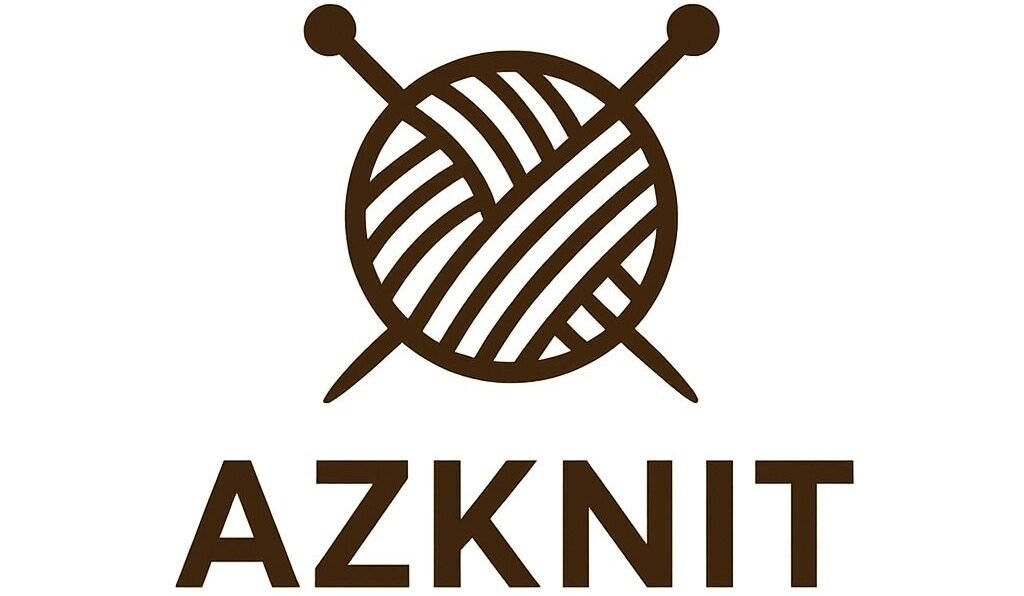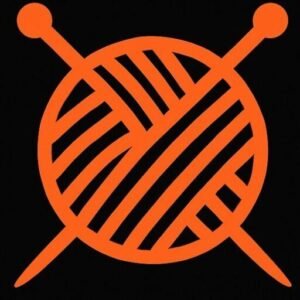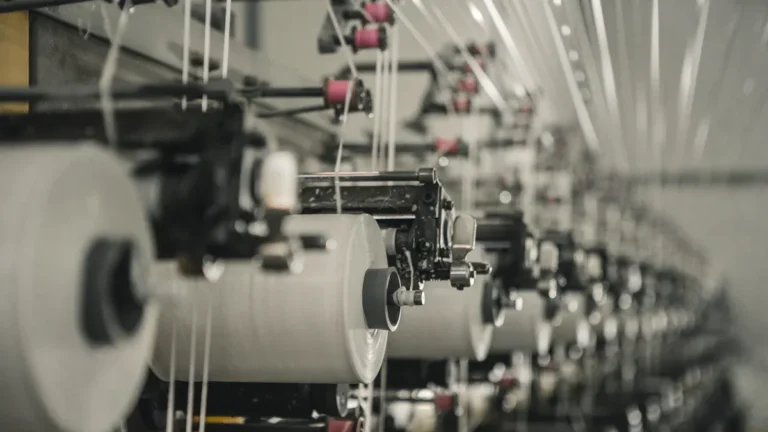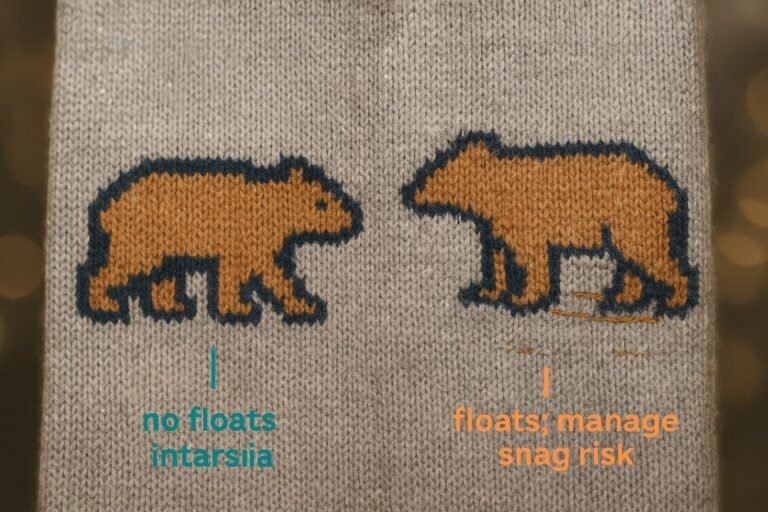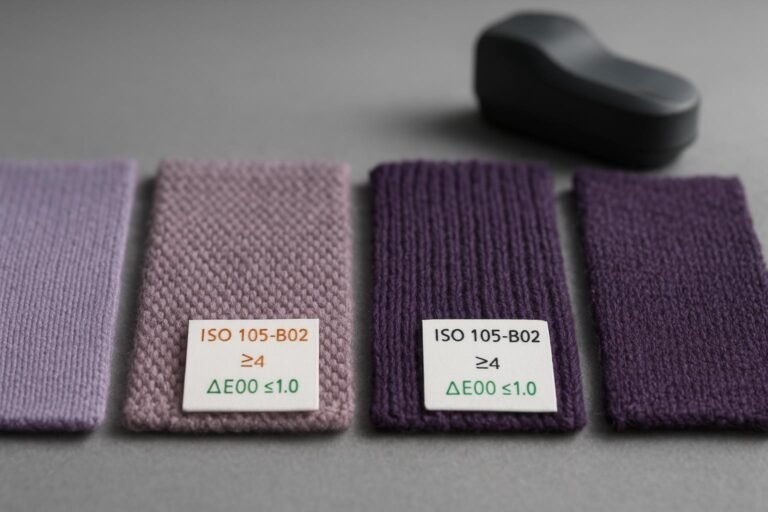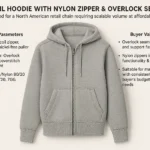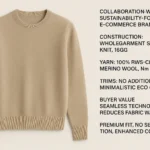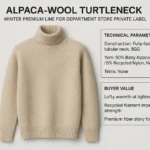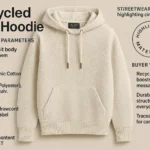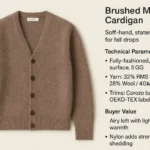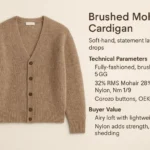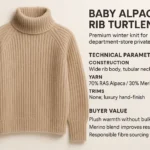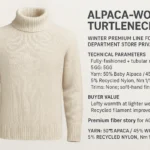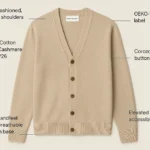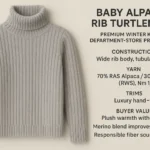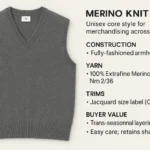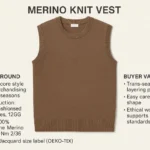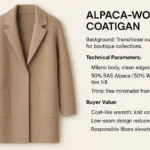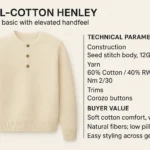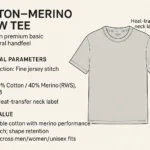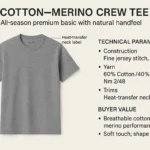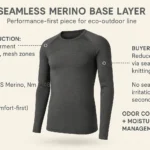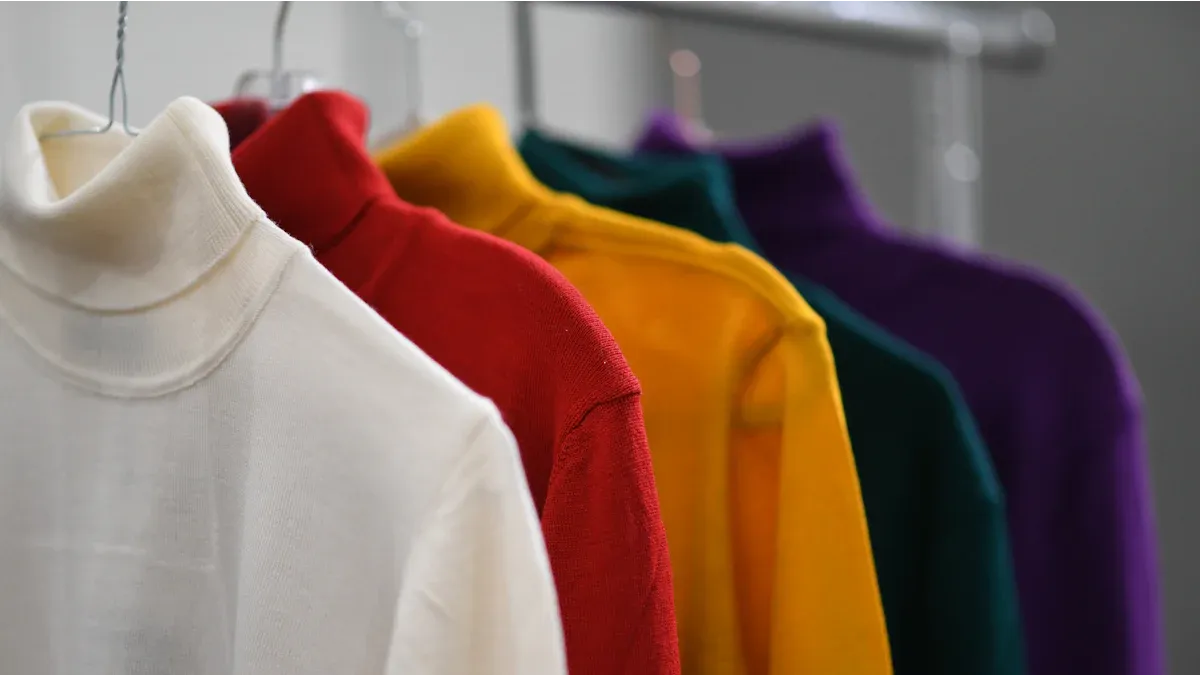
You walk into a shop in London and ask for a turtleneck. The staff looks puzzled. In british stores, you need to say polo neck or polo-neck. These words come from differences in fashion and language. People in the UK use polo neck when talking about high-necked sweaters, while Americans say turtleneck. If you wonder What Do the British Call a Turtleneck?, you are not alone. Knowing the right term helps you shop, talk about style, and avoid confusion.
Key Takeaways
In the UK, you should ask for a ‘polo neck‘ or ‘polo-neck’ if you want a sweater with a high neck. People in Britain use this word a lot in fashion.
In the US, people say ‘turtleneck’ instead. Using the right word helps you shop easily and not get mixed up.
The polo neck has a long history in British fashion. Polo players first wore it to stay warm. Now, it stands for a relaxed look and comfort.
Countries have different words for the same style. In Australia, people call it a ‘skivvy.’ Learn these words if you travel.
Knowing the difference between polo necks, turtlenecks, and roll necks helps you pick the best sweater for any event.
What Do the British Call a Turtleneck?

You might wonder, what do the british call a turtleneck? If you ask someone in the UK, you will hear the term polo neck or polo-neck. This can feel confusing, especially if you grew up calling it something else. Let’s break down what these words mean and how they show up in daily life.
Polo Neck in the UK
In the UK, when you want a sweater with a high, round collar that folds over and covers your neck, you ask for a polo neck or polo-neck. People use this word for both men’s and women’s clothing. You might hear someone say, “I’d prefer a sweater with a polo neck,” or “Why don’t you wear your black polo neck?” These phrases come straight from British and American English dictionaries. The polo neck is a classic piece in British fashion. You will see it in shops, magazines, and even school uniforms. The collar is usually thinner and folds over itself, making it look casual and easy to wear every day.
Turtleneck in the US
Now, what do the british call a turtleneck if they visit America? In the US, you will hear the word turtleneck almost everywhere. American fashion magazines and stores use turtleneck to describe a sweater with an extra high collar that often ends just under your jawline. The collar is usually thicker and stands up more than a polo-neck. People in the US see the turtleneck as a smart-casual or even formal item. You might wear it to a dinner or a meeting. Here’s a quick look at how these terms show up in fashion:
Term | Description | Usage Context |
|---|---|---|
Turtleneck | A sweater with an extra high collar that often ends just under the jawline. | Commonly used in the US fashion. |
Polo Neck | Often seen as an ‘everyday’ item, with a thinner collar. | More casual, popular in UK fashion. |
You can see that what do the british call a turtleneck is not just about words. It is also about style and how people wear these sweaters.
Roll Neck and Other Terms
You might hear other names for this style, too. In the UK, some people say roll neck or roll-neck. This word means a sweater with a collar that rolls over itself, but it is not as common as polo-neck. In South Africa, you might hear roll neck as well. Australians use the word skivvy for a similar style. In the US, you might see the word turtle-neck, but turtleneck is much more popular.
Let’s look at how the collars differ:
Collar Style | Description | Fit Type | Style Type |
|---|---|---|---|
Turtleneck | High, folded collar that covers the neck. Elegant and warm. | Sophisticated, slim or standard fit | Smart-casual to formal |
Polo Neck | Thinner, folded collar. Sits close to the neck, more casual. | Everyday fit | Casual |
Roll Neck | Collar rolls over itself, softer look. | Relaxed fit | Casual |
Tip: If you shop in the UK, ask for a polo neck or polo-neck. In the US, say turtleneck. If you travel to Australia, try skivvy. This helps you find the right sweater and avoid confusion.
So, what do the british call a turtleneck? Most of the time, you will hear polo neck or polo-neck. Sometimes, you might hear roll neck or roll-neck. The words change, but the style stays classic. Next time you shop or talk about sweaters, you will know exactly what to say.
Polo Neck Origins
History in British Fashion
You might think the polo neck is just a sweater, but it has a rich story in British fashion. The style first appeared in the late 19th century. Polo players wore it for practical reasons. The high neck kept them warm during chilly matches. People called it a polo-neck because of this connection. Over time, the polo neck moved beyond the sports field.
Here’s a quick look at how the polo neck became part of British culture:
Time Period | Description |
|---|---|
Late 19th Century | Polo players wore the polo-neck for warmth and comfort. |
Early 20th Century | Artists and writers started wearing the polo neck, making it a symbol of modern style. |
1920s | Noël Coward, a famous playwright, made the polo neck popular as a sign of comfort and rebellion. |
By the 1950s and 1960s, you could see the polo neck everywhere. University students and artists loved it. The style became a sign of creativity and independence. The polo-neck even crossed over to other countries, connecting American beats, French thinkers, and British trendsetters.
Why Polo Neck Became Standard
You might wonder why the polo neck became the standard term in the UK. The answer goes back to its roots in sports and fashion. The roll neck sweater first gained attention among polo players in the mid-19th century. Later, it became popular with fishermen and sailors because it kept them warm. The polo-neck then moved into everyday fashion, especially after Noël Coward wore it in 1924.
Here’s why the polo neck stands out:
The polo neck became a classic choice for anyone who wanted a smart but relaxed look.
It offered a softer alternative to stiff collars, making it perfect for both men and women.
The roll neck and roll-neck styles also appeared, but the polo-neck stayed the most popular in the UK.
Today, you see the polo neck as a classic piece in British wardrobes. It works for school, work, or a night out. You can spot it in old photos of artists, writers, and even movie stars. The polo-neck has stood the test of time and remains a favorite for its comfort and style.
Turtleneck Origins
American Adoption
When you think of a turtleneck, you see a sweater with a tall collar. This style became popular in the United States in an interesting way. In the 1800s, men wore turtlenecks to stay warm. Fishermen and polo players liked them for this reason. It is surprising that a simple sweater became so famous. But that is what happened.
In the early 1900s, women started wearing turtlenecks too. The “Gibson Girl” look made the turtleneck a sign of beauty. By the 1960s and 1970s, turtlenecks were everywhere. People wore bright colors and new designs because of the Peacock Revolution. They wanted to be different, and turtlenecks helped them stand out. New ideas about men’s fashion made the sweater even more popular.
Did you know? In these years, turtlenecks showed confidence and creativity. You could wear one to look smart, cool, or even a little rebellious.
Style and Popularity
You might ask why turtlenecks became so popular. The answer is easy: famous people wore them. Audrey Hepburn wore a turtleneck in “Funny Face.” After that, many people wanted one. Marilyn Monroe, Steve McQueen, and Julia Roberts also made turtlenecks cool. Activists like Gloria Steinem wore them in the 1970s to show power.
Here is a quick look at how turtlenecks changed in America:
Decade | Style Trend | Famous Wearers |
|---|---|---|
1950s | Smart, stylish | Audrey Hepburn, Marilyn Monroe |
1970s | Bold, strong, feminist | Gloria Steinem, Steve McQueen |
1990s-2000s | Casual, fits many looks | Julia Roberts, Britney Spears |
You can see turtlenecks on stars like Penelope Cruz, Diane Keaton, and Elvis Presley. The sweater works for almost any style, from casual to dressy. If you want to look smart or stay warm, a turtleneck is a good choice. Americans still love this sweater today, and it is a classic in many closets.
Comparing Styles
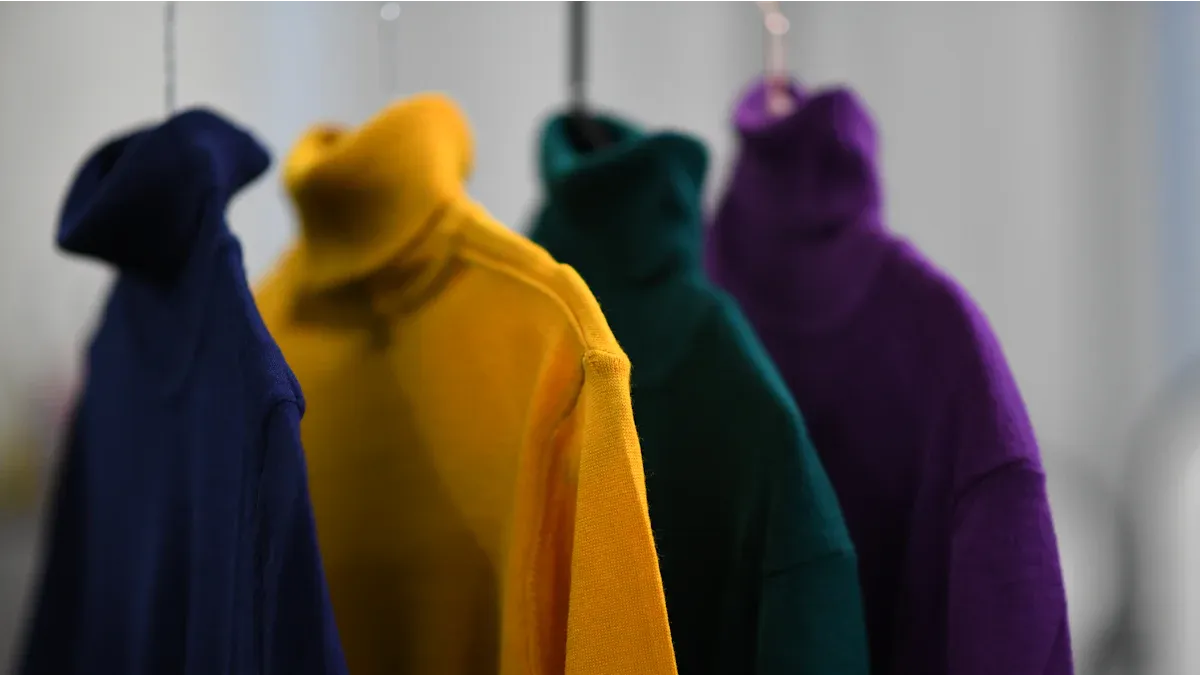
Collar Differences
When you look at sweaters with high necks, you might wonder what makes each style unique. The collar is the main feature that sets a polo neck, turtleneck, and roll neck apart. You can spot these differences just by checking how the collar sits and feels.
A polo neck usually comes up to your chin and folds over in a double layer. You see this style a lot in British fashion. Polo neck sweaters are often lightweight, so you can wear them in summer or layer them under jackets. They feel casual and easy to style for everyday looks. If you want a wardrobe staple that works for many occasions, a polo neck jumper is a great choice.
A turtleneck has a slightly raised neckline. It comes halfway up your neck and often sits away from it. The collar is thicker and stands up more, giving you a sophisticated look. Turtlenecks work well for smart-casual outfits. You can wear them under dresses or with skirts for a chic style.
The roll neck features a collar that folds over and fully covers your neck. This style gives you extra protection against cold weather. Roll neck sweaters can be thin for layering or thick for warmth. Sometimes, a thick roll neck can make your shoulders look bigger, but it keeps you cozy. In the UK, people use roll neck and polo-neck to mean almost the same thing, but roll-neck is less common.
Here’s a quick table to help you compare the styles:
Sweater Type | Description |
|---|---|
Polo neck | Comes almost up to the chin and folds over in a double layer. Lightweight and casual. |
Turtleneck | Slightly raised neckline that comes halfway up the neck and often sits away from it. Thicker and more formal. |
Roll neck | Collar folds over and fully covers the neck. Offers extra warmth and protection. |
You can find these styles in many materials. Cotton and wool are popular for roll neck and turtleneck sweaters. Polo neck sweaters come in cotton, wool, linen, and other fabrics. If you want something soft and warm, try a roll neck in wool. For a lighter feel, pick a polo neck in linen or cotton.
Fashion designers say you can style polo necks in many ways. They are casual and versatile, so you can pair them with jeans, skirts, or even blazers. Turtlenecks look great under dresses or with accessories for a chic look. Both styles are wardrobe staples because you can wear them for work, school, or a night out.
Tip: If you want a sweater for layering or summer, choose a polo neck. For cold days, a roll neck keeps you warm. Turtlenecks give you a smart look for special occasions.
Regional Variations
You might notice that people use different words for these sweaters depending on where you live. The term polo neck is common in the United Kingdom. If you shop in London, you will see polo neck and polo-neck on tags and signs. Roll neck is also used in the UK, but not as often. In South Africa, roll neck is the usual term.
In the United States, you will hear turtleneck almost everywhere. Stores and magazines use turtleneck to describe sweaters with high collars. Australians call this style a skivvy. If you travel, knowing these terms helps you find the right sweater and avoid confusion.
Here’s a table to show you how the terms change by country:
Country | Term Used |
|---|---|
United States | Turtleneck |
United Kingdom | Polo neck / Roll neck |
Australia | Skivvy |
You see that the same sweater can have different names. If you want a wardrobe staple that fits your style, ask for a polo neck in the UK or a turtleneck in the US. In Australia, look for a skivvy.
Materials also change by region. In British shops, you find roll neck sweaters in cotton or wool. Polo neck sweaters come in cotton, wool, linen, and more. American stores offer turtlenecks in cotton and wool. No matter where you shop, you can find a style that fits your needs.
Polo neck jumpers are a staple in British wardrobes. People wear them for school, work, and casual outings. In America, turtlenecks are a wardrobe staple for smart and casual looks. Roll neck sweaters are popular in cold climates because they keep you warm.
Note: If you want to build a versatile wardrobe, add a polo neck, a roll neck, and a turtleneck. You will always have the right sweater for any occasion.
Using the Right Term
Audience and Location
When you talk about sweaters, the words you use can change how people see you. If you say “turtleneck” in London, you might get a confused look. In New York, “polo neck” sounds unusual. The term you choose helps you fit in and makes your message clear. You want to connect with your audience, whether you are shopping, chatting with friends, or reading a fashion magazine.
Fashion words do more than describe clothes. They create images in your mind. For example:
The word “turtleneck” might make you think of American movies or classic style.
“Polo neck” brings up British fashion and a relaxed look.
“Roll neck” sounds cozy and warm, perfect for winter days.
You also see that different groups use these words to show who they are. Teenagers at one school might all wear the same style to feel like a team. Fashion terms can help you feel like you belong.
Tip: When you travel or shop online, check what words people use in that country. This helps you find what you want and makes shopping easier.
Shopping Tips
Shopping for sweaters in another country can feel tricky. You want to use the right word so you get the style you like. Stores and websites use different names for the same thing. Here’s a quick guide to help you:
Country | Preferred Term | Description |
|---|---|---|
United States | Sweater | Standard name for any knitted, long-sleeved top designed to keep warm. |
Canada | Sweater | Similar to the US, Canadians prefer the term ‘sweater’. |
UK & Ireland | Jumper | Commonly used for knitted garments worn over a shirt or blouse. |
Australia & NZ | Jumper | Also commonly uses ‘jumper’ due to historical ties to Britain. |
Germany, Austria, Switzerland | Pullover | Widely used term for warm, knitted garments worn over the upper body. |
France | Pull | Shortened version of ‘pullover’, commonly used in French. |
Italy | Pullover | Directly borrowed from English, standard in Italian. |
If you want a high-neck sweater, ask for a “polo neck” in the UK, a “turtleneck” in the US, or a “skivvy” in Australia. Using the right word saves you time and helps you get exactly what you want.
Remember: The right term opens doors. It helps you shop smarter and talk about fashion with confidence. 🧣
You now know the main differences between a polo neck, turtleneck, and roll neck. The table below shows how each style stands out:
Type | Description | Usage Context |
|---|---|---|
Roll Neck | Cozy neckline that rolls over toward the chest. | Great for casual or smart looks. |
Turtleneck | High, tubular collar that fits close to the neck. | Perfect for layering and cool weather. |
Polo Neck | Thinner collar, seen as an everyday item. | Works well for casual outfits. |
In the UK, people say polo neck or polo-neck because polo players wore them first. In the US, turtleneck became popular for many styles. When you shop or talk about sweaters, use polo neck in Britain and turtleneck in America. Feel confident using these terms wherever you go!
FAQ
Why do people in the UK say “polo neck” instead of “turtleneck”?
You hear “polo neck” in the UK because polo players wore this style first. The name stuck. In America, “turtleneck” became popular for the same sweater.
Is a roll neck the same as a polo neck?
You see both terms in British shops. A roll neck usually has a softer, rolled collar. A polo neck folds over and looks thinner. Most people use them interchangeably.
Can you wear a turtleneck in warm weather?
You can! Many brands make lightweight turtlenecks and polo necks. Choose cotton or linen for summer. These styles work well for layering, even when it’s not cold.
What should you ask for when shopping online?
You want to check the country first. In the UK, search for “polo neck.” In the US, look for “turtleneck.” If you shop in Australia, try “skivvy.” This helps you find the right sweater.
